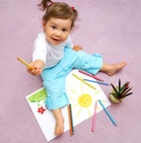As your child turns 20 months of age, you may find that you have a new artist in the house, although her eating habits can change daily as she discovers that food can taste, feel and look different.
Your Child’s Development

In month 20, you will notice that your toddler’s fine motor skills are developing rapidly. You may have a budding artist in the family! She can now hold a crayon or pencil and draw more precisely than she did in the past. It probably still looks like scribbles, but these scribbles are now more likely intentional instead of random. Some may be able to draw a straight line. To encourage her artistic skills and help her fine tune her motor skills, provide her with lots of art supplies. Thick crayons or washable markers are best for your child’s little hands. You can also tape large sheets of paper on the table. This makes it easier for your toddler to draw and will help eliminate artwork from ending up on the table.
Your 20 month old can now use a fork or a spoon, although often prefers to still use her fingers. Her decisions on what food she will eat however, will change daily, and where once she ate a certain food without a problem, you may find on a given day she chooses against it, for many reasons including how it looks, feels and tastes. Don't be discouraged though, you can still offer her different foods, and she will more than likely come around, as long as you don't force the issue. Finger food at this age should still be bite-sized to avoid choking, even though your 20 month old is quite adept at chewing.
Another development around this time is curiosity in their own body that wasn't there before. From nose picking to exploring private parts and nail biting and thumb sucking the list may seem endless, but fear not, this behaviour is normal, however, if you find the behaviour is bothersome in public, there are ways you can distract and discourage by explaining to your little one that it's not something we do in public. Sometimes the behaviour may be a comforting technique, rather than exploratory, and so knowing when the behaviour might kick in can help you avoid it by offering a distracting toy to hold on to instead. In reality, your little one will grow out of these habits, and in many cases it's easier to ignore, if you can.










